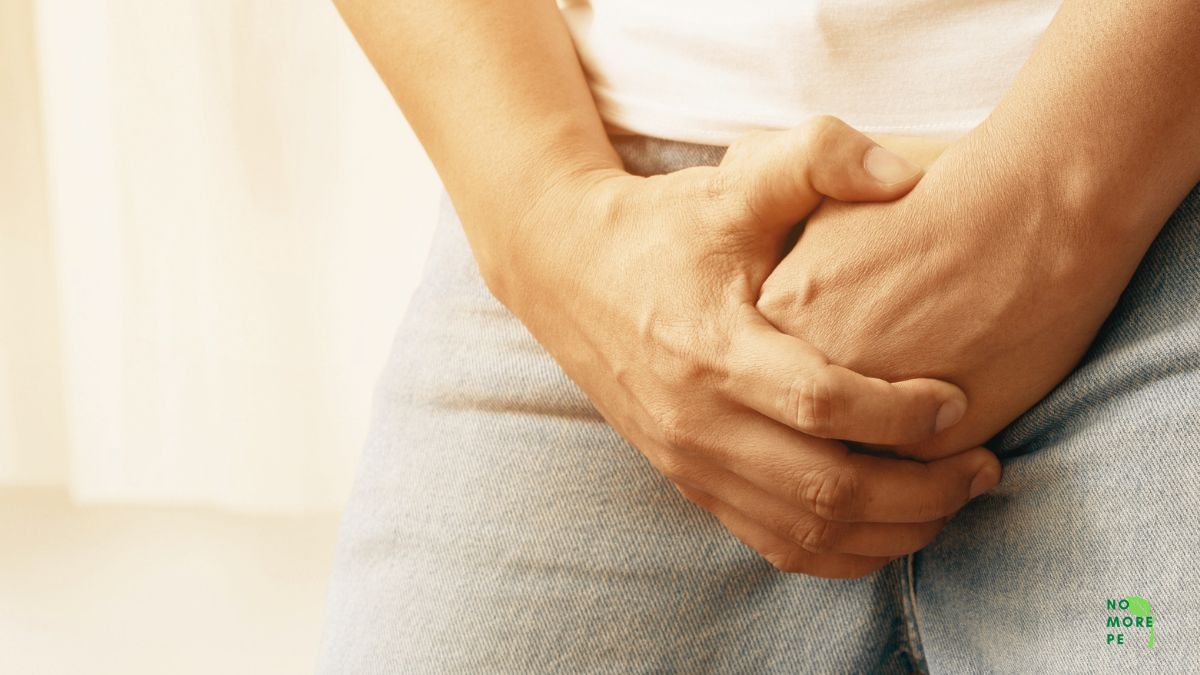Premature ejaculation (PE) is a sexual dysfunction where men fail to last longer in bed by losing control over ejaculation. When you orgasm before you want to actually ejaculate, you are suffering from PE.
Often it puts you at a disappointment as many myths come with sexuality and male-hood. As it is a serious health issue for many males, there is a need for a deep understanding of the topic and the consequences, letting go of false thoughts.
This premature ejaculation guide walks you through the definition of premature ejaculation, its types, symptoms, causes, treatment methods, and more.
Table of Contents
What is Premature Ejaculation?
Premature ejaculation is defined as a sexual disorder when a man ejaculates before he (or his partner) actually wants to. The cut-off time is a minute for premature ejaculation. If you ejaculate in less than a minute with or without intercourse, you are suffering from premature ejaculation.
Ejaculation means to expel semen from your body. When you ejaculate faster than you want to, you have a sexual disorder known as PE.
There is no specific time to ejaculation. However, if you ejaculate soon after vaginal penetration, then you or your partner may not have sexual satisfaction as much you would have loved to. It can be embarrassing and even frustrating. And lead to performance anxiety.
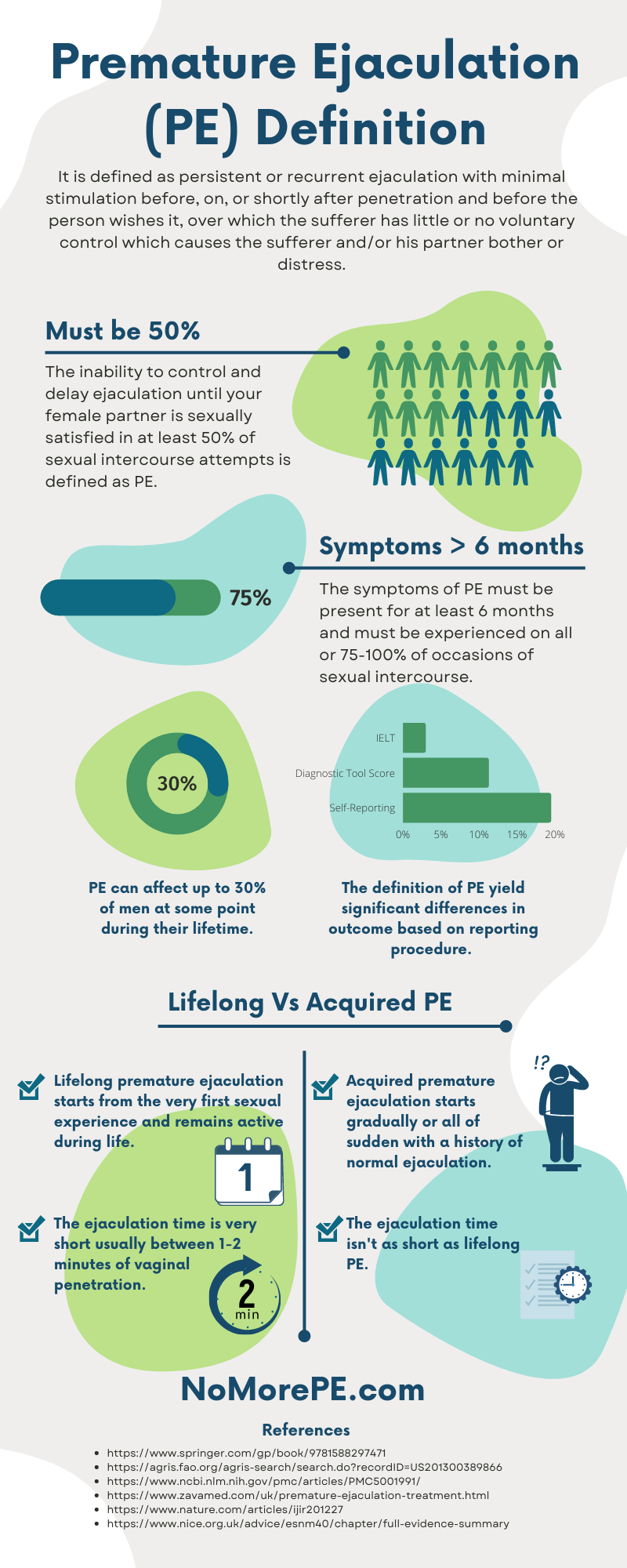
At least 1 in 3 men experience premature ejaculation at some point in their lives. The average amount of time a man suffering from PE lasts is 1.8 minutes. If you ejaculate consistently well before 1.8 minutes, you might be suffering from PE.
Other names for premature ejaculation are:
- Early ejaculation
- Early discharge
- Early climax
- Premature climax
- Premature orgasm
- Rapid climax
- Rapid ejaculation.
Premature ejaculation happens in 30 seconds to a minute. In some cases, it can occur even before penetration. Contrary to what we see in adult movies, the average time it takes before a man ejaculates is 4-5 minutes. So, it is important to note that the depictions given by pornographic movies are very unrealistic.
Sometimes, PE occurs alongside erectile dysfunction (ED). Any man can have an erectile dysfunction irrespective of the age. However, premature ejaculation is usually more common among younger men.
Men in their 60s and 70s may experience some degree of erectile dysfunction alongside premature ejaculation. Sometimes, ejaculation occurs even when the penis is flaccid.
Most men with early discharge insist that they have little or no control over ejaculating. Whether this is true or not is yet to be cleared. Most men have expressed their desire to last longer in bed. Most men with less control over ejaculation report performance anxiety, lack of pleasure, depression, and poor sexual performance.
Some even avoid sexual intercourse as a means of escaping the embarrassment of lack of ejaculatory control. Women consider time to ejaculate less of a problem, but studies have shown that it distresses some women.
Early discharge isn’t necessarily a sign of a serious underlying health condition. In rare cases, it may result from damage to the nervous system (usually from trauma or surgery), a spinal cord problem, or inflammation of the prostate gland.
The primary symptoms of premature ejaculation include:
- Rapid ejaculation that occurs even in the absence of stimulation
- Inability to enjoy sexual intimacy due to little control over ejaculation
- Feelings of embarrassment, guilt, or frustration
- Lack of interest in sexual activity.
Is Premature Ejaculation a Form of Sexual Dysfunction?
Yes, it is.
The term sexual dysfunction is used to describe those medical issues that prevent a couple from enjoying sexual encounter.
However, PE differs from erectile dysfunction.
A man who has erectile dysfunction cannot have an erection or even maintain one. As such, the sexual partners will be unable to have a fun and satisfying vaginal penetration. Sometimes, PE occurs alongside erectile dysfunction.
Types of Premature Ejaculation
Depending on what causes you to suspect premature ejaculation, there are three major types of this early ejaculation:
- Lifelong premature ejaculation
- Acquired premature ejaculation
- Normal variable premature ejaculation.
If you ever feel that you need a delay, there is a chance that you are suffering from one of the above causes of premature ejaculation. But how do you find which one is your type of rapid ejaculation?
1. Lifelong Premature Ejaculation
This type of premature ejaculation is often termed primary premature ejaculation and it involves the persistent inability to delay an erection or ejaculation right from the first attempt of having sex till forever.
- If it’s a constant and persistent occurrence for you to ejaculate earlier than you want and an early ejaculation occurs every single time, then you most probably are having a lifelong premature ejaculation.
- This is how a person would know if it is a lifelong premature ejaculation or any other type.
- All the time you had sex you were unable to delay the ejaculation and you realize every time that it came up at the wrong instant, that is you never had a chance to ejaculate on time, on which you decided to occur and it happens earlier always.
- There is no permanent cure for lifelong premature ejaculation, however, behavioral and psychological therapy can be used to treat the problem temporarily. There is no promise if these therapies are going to work but according to scientific pieces of evidence, there is almost a 60% success rate of psychological therapy.
2. Acquired Premature Ejaculation
This type is also called secondary premature ejaculation and it involves the occurrence of an early ejaculatory event after the male already had few normal ejaculatory events.
- Contrary to a lifelong premature ejaculation it is when you have a period of normal ejaculation followed by a period where you are unable to delay the ejaculations.
- The underlying causes for acquired premature ejaculation could be anything ranging from physical to psychological causes.
- It is seen that a lower amount of serotonin in the body can be the major cause along with anxiety and depression or old age.
- Once you get the idea that your premature ejaculation problem is secondary to another cause you can resolve the problem by resolving the underlying cause.
- You need to take a moment and think of the comorbidity you are diagnosed with or suspected for, and then get treatment for that, whether it is a physical or systemic issue or a psychological one.
3. Normal Variable Premature Ejaculation
Premature ejaculation is termed as a normal variable when there is a random occurrence of premature ejaculation.
- If you are having a normal ejaculation most of the time but there are few periods of ejaculatory dysfunction that comes randomly and infrequently, you are having a normal variable premature ejaculatory dysfunction.
- This type of premature ejaculation is not necessarily considered an ejaculatory dysfunction as it can be rooted in other haphazard events in your life, like affective disorders, erectile dysfunction, or medication side effects.
- However, it does have a negative impact on the person suffering due to lack of knowledge.
Lifelong vs. Acquired vs. Normal Variable Premature Ejaculation
Normal variable premature ejaculation should not be confused with acquired premature ejaculation as both have a distinction in a manner that acquired PE is when you can not at all get a normal ejaculatory interval after you already had normal ejaculations in the past, whereas, a normal variable is when you suffer from the dysfunction in an “on and off” pattern. Once your ejaculatory interval is normal and the next few times you are unable to delay but again you achieve to delay it for few times.
Comparing a lifelong PE is a whole new story and does not resemble both of the later types. It is characterized as a complete inability to delay an ejaculation throughout your lifespan, and with lifelong dysfunction, you are not able to achieve a normal ejaculatory interval, not even once in your life.
Signs and Symptoms of Premature Ejaculation
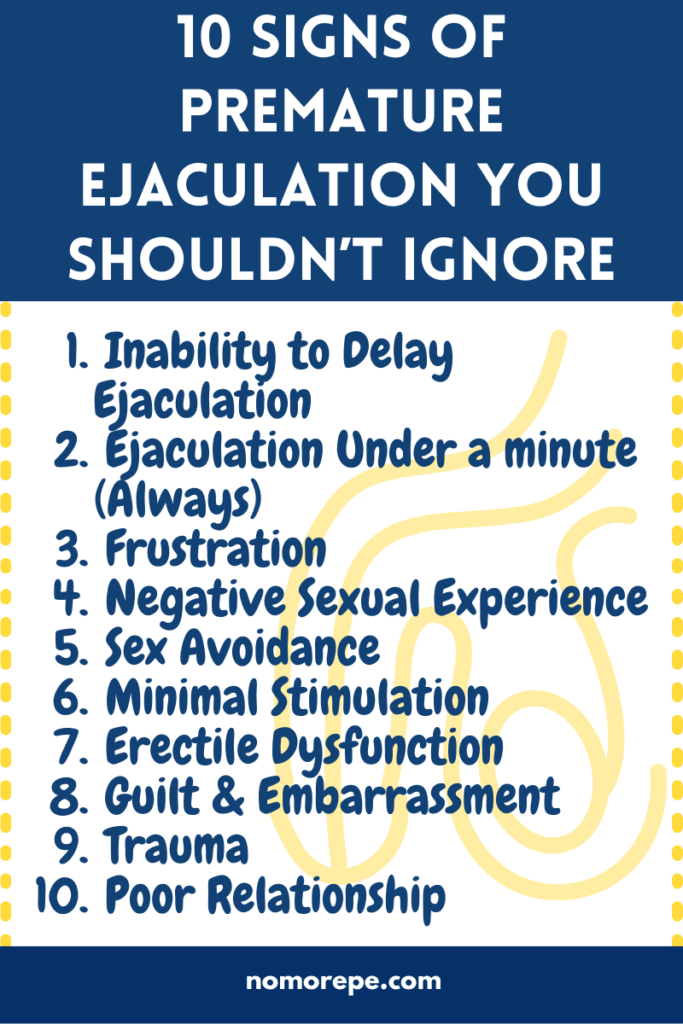
1. Inability to Delay Ejaculation
This is the core sign you must be cautious of.
When you are unable to delay ejaculation during sexual intercourse nearly all of the time and you can’t control your ejaculation, that’s a symptom of premature ejaculation.
It feels like you can’t ejaculate at will. You discharge at the moment when you don’t want to. This is a clear sign of premature ejaculation.
Here is how it feels:
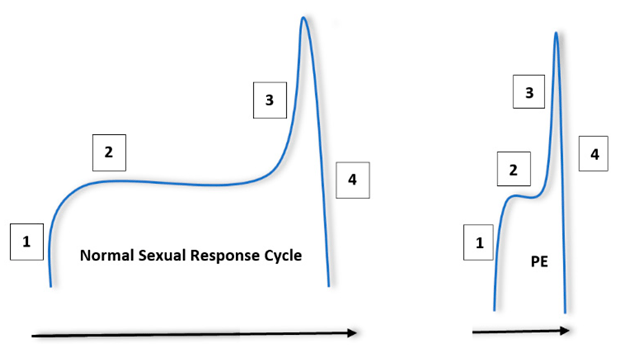
It represents normal sex vs. premature ejaculation sex. Here is what the numbers mean:
1 = Sexual arousal
2 = Plateau period (the sexual arousal is intensified in this phase)
3 = Orgasm (ejaculation)
4 = Postejaculatory detumescence and resolution (body and sexual organs return to normal).
In the case of premature ejaculation, all the phases of sexual intercourse are very short duration and sharp. And you’ll not be able to extend its duration even if you want to. This is what’s known as a lack of ejaculation control.
Delayed ejaculation doesn’t always mean you are suffering from premature ejaculation. Several physical and emotional changes can impact ejaculation and timing such as depression, anxiety, taboos, mental health condition, relationship issues, etc.
And the good news is: This type of early ejaculation is temporary and disappears automatically after a few days.
In any case, it is an early sign of premature ejaculation irrespective of the cause.
2. Regularly Ejaculating within One Minute After Penetration
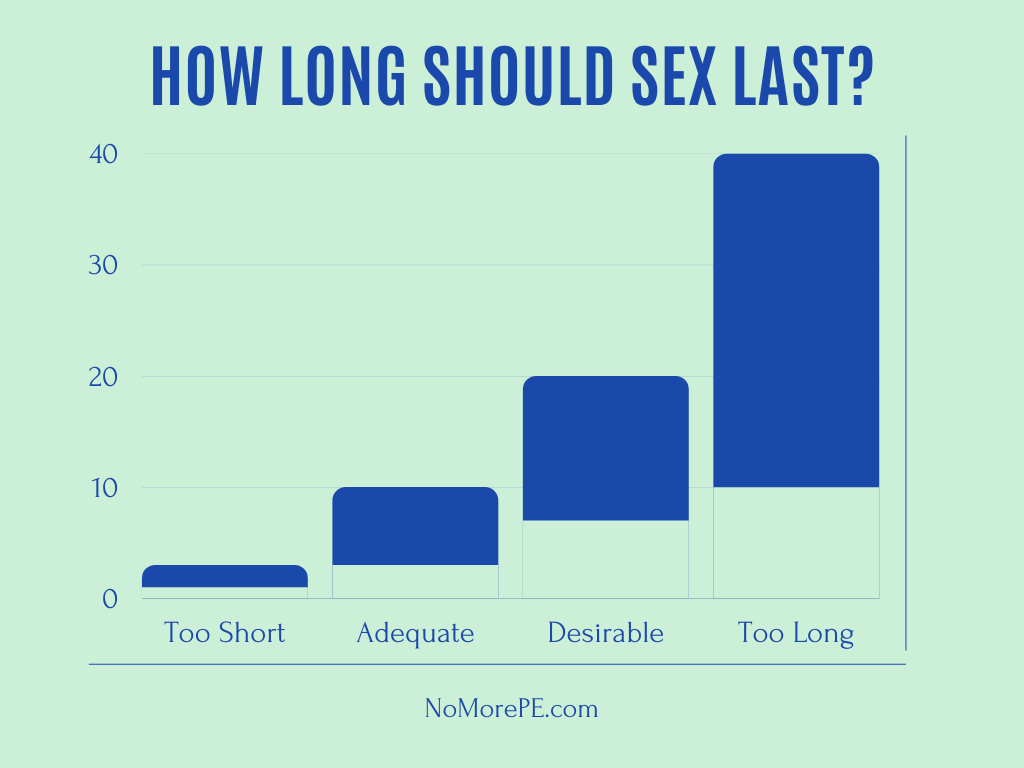
Experts agree with the common definition of premature ejaculation. When you ejaculate regularly in less than a minute after vaginal penetration, you are said to be suffering from premature ejaculation.
I know it sounds illogical (and ridiculous) to calculate exact ejaculation time. You can’t use a stopwatch during sex.
The thing is if it happens a few times, it is fine. But once it starts happening regularly, then it is something to be worried about.
I’m sure if you discharge in less than a minute after inserting the penis into the vagina, you’ll get to know it if it happens regularly (or almost every time).
And this is one of the most common signs of premature ejaculation.
3. Persistent Distress and Frustration
This happens a lot. Frustration and distress are both symptoms and causes of premature ejaculation.
If you are constantly frustrated and stressed due to any reason (personal, financial, or emotional), it impacts sex and timing. You’ll start losing control over ejaculation and this is because you can’t give 100% of your body and mind to sexual intercourse.
Sex doesn’t just need your body rather it needs your brain too. If you are stressed, it might lead to temporary premature ejaculation.
On the other hand, if you have premature ejaculation and you can’t satisfy yourself and your spouse in bed, it will lead to frustration and distress.
So, it works both ways.
In the first scenario, you need to cure frustration while in the second case, you need to treat premature ejaculation. Cure the cause, not the symptom.
4. Negative Experience After Sexual Intercourse
Have you had sex and then regretted or felt rejected?
This is most likely due to early discharge.
If you always or mostly feel bad after sex and you don’t get the satisfaction you desire, it is a sign you are moving towards secondary premature ejaculation.
Why do you have a negative experience after sex?
It is due to the fact that you ejaculate too early than you want to. You want to enjoy more of it but can’t control ejaculation. And this is an early sign that might lead to premature ejaculation if not addressed on time.
5. Sexual Intimacy Avoidance
Do you avoid (intentionally or unintentionally) sex, sexual intimacy, or sexual intercourse?
This is a sign of premature ejaculation. Your brain tells you to avoid sex or anything related to sex to avoid stress, frustration, and embarrassment. This is how the human brain works.
As soon as it detects anything fishy, your brain will avoid it.
6. Minimal Stimulation
Lack of interest, enthusiasm, and stimulation in sex or any sexual activity is a clear sign of premature ejaculation.
Even if you ejaculate, you don’t get the excitement, pleasure, and joy when you are ejaculating indicates PE. This happens because you ejaculate so early that your mind and body don’t get enough time to enjoy sex.
Instead, it makes you anxious and distressed.
7. Erectile Dysfunction
If you start feeling that you are unable to keep your penis erect, it is a sign that you are suffering from premature ejaculation.
While erectile dysfunction doesn’t always mean you have PE but in some cases, PE patients start having erection problems.
Why?
Because the fear of early discharge makes you go through sexual intercourse quickly. You are thinking about quick discharge and your mind stays active and busy thinking about PE and it negatively impacts erection and erection quality.
8. Guilt and Embarrassment
Yes, you’ll live with this constant guilt and embarrassment that you aren’t able to satisfy your sexual partner in the bed. You consider yourself a failure. You feel that you aren’t giving your 100% to the relationship.
This is something natural. When you can’t do something or you aren’t capable enough, you start blaming yourself.
9. Trauma
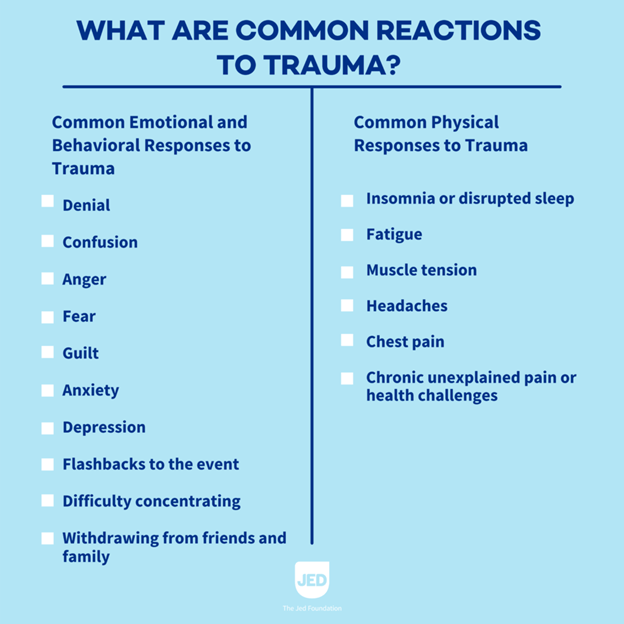
In some cases, trauma is also a sign of premature ejaculation. It is more common in youngsters who start experiencing signs of premature ejaculation and they get confused and anxious.
This often leads to traumatic experiences.
10. Poor Relationship
Perhaps the biggest sign of quick discharge is that it directly impacts your relationship.
You need to understand underlying meanings and reactions. Most women won’t just say that they aren’t happy with your timing. This rarely happens. Rather it impacts their mood and emotions in several ways. You need to look for queues.
If you notice that things aren’t moving as expected, there might be an issue with sexual intercourse timing. You never know…
Premature Ejaculation Causes
Unfortunately, the exact cause of premature ejaculation is unknown.
In most cases, it is entirely psychological. However, some biological factors also play an important role (particularly in lifelong premature ejaculation). These patients have a chemical imbalance in the nerve endings controlling the penile erection (known as the neurobiological cause).
Both the psychological factors (e.g., anxiety and depression) and biological factors cause premature ejaculation in men. Both psychological and biological causes are listed below:
1. Trauma and Sexual Abuse
Trauma can be one of the main causes of premature ejaculation and this condition can often be relatable to previous trauma such as:
- Harsh and strict sexual teaching and upbringing
- Negative childhood experiences
- Traumatic experiences of sex
- Traumatic injury to sexual organs leading to nerve damage.
If the trauma or sexual abuse is a cause of premature ejaculation, it gets hard to get rid of it. And you’ll need help from an expert to get things sorted. You can’t identify the cause of PE or distress to sexual activity yourself in case of trauma. An expert will identify it after a detailed examination and consultation.
How to get rid of this problem?
You need to seek help from a medical expert. The treatment mostly includes counseling and behavioral therapies. You might receive mild psychological medication depending on your condition. Numbing products and OTC pills in this case won’t help much. You need to cure the cause and get over it to enjoy your sex life.
2. Stress
Men with low serotonin levels in their brains may have problems with anxiety, depression, and premature ejaculation which may lead to erectile dysfunction. This chemical change leads to constant distress and frustration. Most premature ejaculation patients have problems with anxiety — either specifically about sexual performance or related to other issues.
How to cure it?
Curing stress and anxiety isn’t as easy as it sounds. You need to get rid of what causes you stress. Find the root cause. Is it your job, financial crisis, relationship, family concerns, or anything else?
You need to get rid of what’s causing you stress and leading to a quick discharge problem. Thanks to PE pills that mostly consist of antidepressants such as Lexapro. You need to visit an expert and seek help. You’ll get antidepressants based on your current situation.
Once you fix your stress and anxiety, you’ll notice a significant increase in ejaculation duration.
3. Erectile Dysfunction
Yes, erectile dysfunction causes premature ejaculation.
Men who have issues maintaining an erection mostly suffer from premature ejaculation for two key reasons:
- If you have erectile dysfunction, you’ll try to ejaculate as early as possible so that you have climax before you lose your erection. In other words, you’ll rush through sexual intercourse and want to avoid the situation where you lose erection before ejaculation
- While you are busy and focusing on maintaining an erection, you get stressed. And stress leads to premature ejaculation. You can’t have peaceful sexual activity when you can maintain an erection. This leads to stress and frustration.
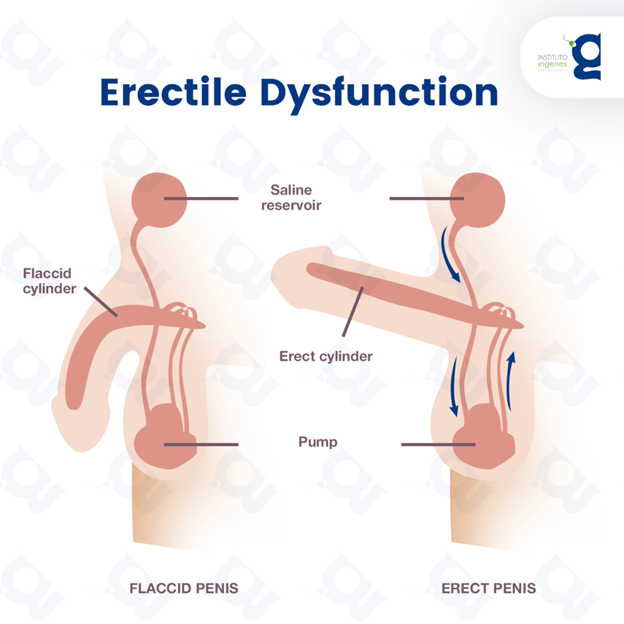
If the cause of premature ejaculation is erectile dysfunction, you need to cure erectile dysfunction. And once it is treated, you’ll get rid of PE too.
Treating erectile dysfunction requires a lot of hard work. Different treatment methods are used to cure erectile dysfunction such as pills, supplements, penile injections, testosterone therapy, and others. Your physician can better guide you on what treatment method to use.
4. Hormone Level
Hormonal imbalance is a common cause of early ejaculation.
Pituitary, adrenal, gonadal, and thyroidal hormones control ejaculation in men at different stages. Any imbalance in these hormones might impact ejaculation speed.
You can’t identify yourself if hormonal levels are causing PE. Only an expert can confirm this after conducting relevant tests.
There are different types of tests available to check your hormonal level. You need to consult a physician who will guide you. If you are suffering from premature ejaculation due to hormonal imbalance, your doctor will prescribe medication accordingly.
5. Inflammation and Infection
Infections and inflammation can also cause temporary premature ejaculation. For example, urogenital infections have a strong positive association with sexual dysfunction in men. Chronic prostatitis is also a cause of secondary premature ejaculation in men.
Again, you can’t detect inflammation and infections yourself. You’ll need to consult a doctor who will examine you thoroughly. Careful physical and microbiological examination of the prostate, urine, and urethra will reveal if PE is caused by any infection.
6. Inheritance
Studies show that premature ejaculation can be inherited. This was confirmed by interviewing male twins about their first sexual encounter. It was found that if one male in the twin pair reported premature ejaculation, the other also reported it. And vice versa.
Research has confirmed that premature ejaculation has a strong relationship with genetic factors and is not just psychological.
If you have inherited premature ejaculation, there is little you can do about it. This type of PE is mostly permanent and hard to cure.
How do you know if premature ejaculation is inherited?
You’ll ejaculate quickly in your very first sex. There won’t be any variations. You’ll always ejaculate in a minute or less. If this is the case, you might have primary premature ejaculation.
How to Tell If You Have Premature Ejaculation
This questionnaire is designed to help you tell if you are suffering from premature ejaculation or not. Kindly choose the most appropriate answer for each of the questions outlined below:
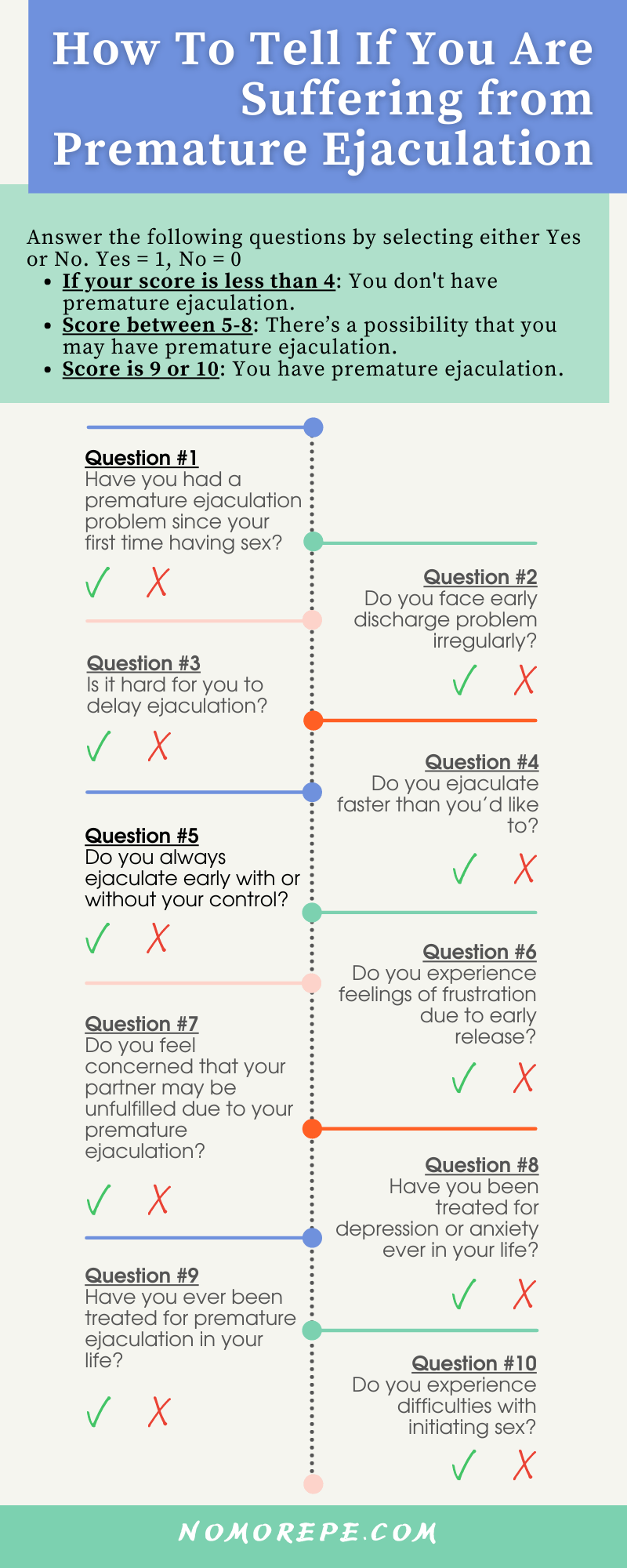
Here is how to calculate your score based on your answers.
For every Yes answer you get one score while No doesn’t have any score. Ideally, your score must be close to zero which indicates you don’t have premature ejaculation at all.
But that’s an ideal situation.
Here is how to interpret your score:
If Your Score is Less Than 4
You have a normal sexual response. You don’t have any symptoms of premature ejaculation. There isn’t anything to worry about.
If Your Score is Between 5-8
There’s a possibility that you may have premature ejaculation.
If you are distressed by your symptoms, please, book a consultation with your healthcare provider. They will conduct a diagnosis and advise or treat appropriately. Your healthcare provider can identify and rule out alternative causes while giving you the right treatment, tailored to your condition.
If Your Score is Between 9-10
You have premature ejaculation. Your symptoms may be similar to those of premature ejaculation. However, you must consult your healthcare provider to get confirmation.
How to Treat Premature Ejaculation
Premature ejaculation can be managed and controlled with the help of the following techniques and methods:
1. Desensitizing Products
Probably the best way to treat secondary and normal variable PE is by making your penis less sensitive during sexual intercourse. This is achieved by using numbing products such as sprays, wipes, condoms, oils, and others.
Desensitizing products use topical anesthetics either benzocaine or lidocaine which are approved by FDA for use in male genital desensitizer products. You need to apply numbing product on your penis topically, wait for 5-15 minutes, and you can then proceed with sexual intercourse. The anesthetic reduces sensitivity of your penis and helps you last longer in bed.
Shop for numbing products for men.
2. Start-Stop and Squeeze Techniques
The start-stop method involves stopping sex when you are almost ejaculating. When you realize that you are about to ejaculate, pull out your penis, and relax. You can continue when the feeling has gone.
Repeat this 3-5 times and then you can ejaculate normally.
For the squeeze method, start normal sex. When you feel like ejaculating, you need to pull out your penis and squeeze it strongly to avoid ejaculation. This will help you regain full control and delay ejaculation.
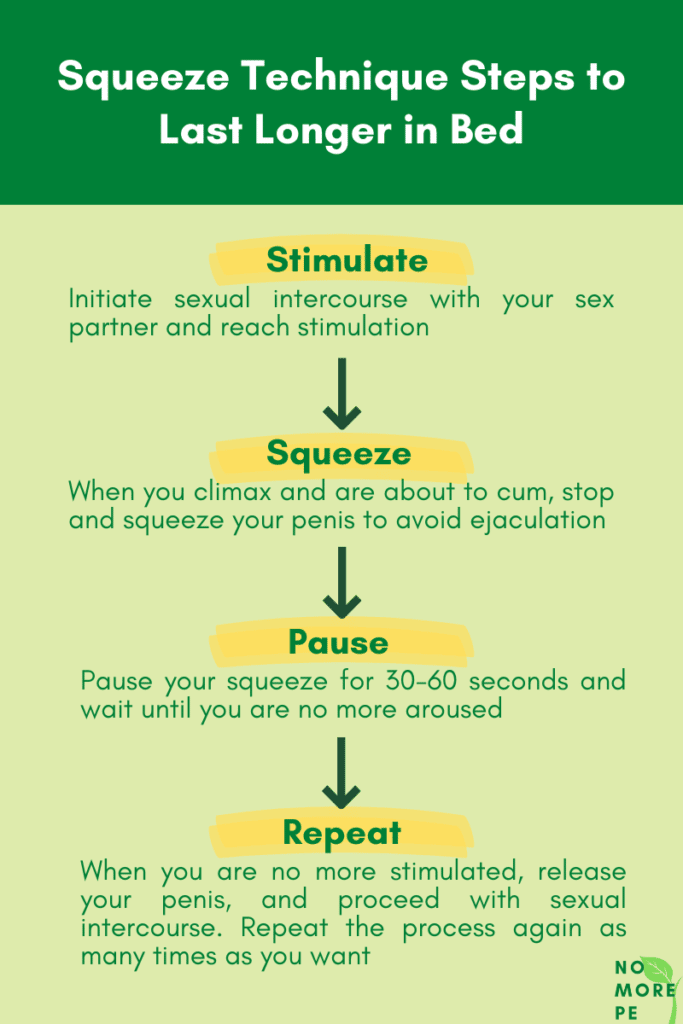
The behavioral therapy does not work immediately. In some cases, its effect may be felt after several weeks.
3. Pelvic Floor Exercise
Doing some muscle exercises can help you delay ejaculation. Pelvic floor exercise is a good example.
Here’s how to locate your pelvic floor muscles.
First, focus on stopping urination or keeping yourself from passing gas using certain muscles. After you find the location of these muscles, you can then do Kegel maneuvers. You can do these exercises sitting, lying down, or standing.
Here’s how to do the Kegel maneuvers:
- First, you tighten the muscles of your pelvic floor up to a count of three.
- Then you relax for another count of three
- This should be done several times at a stretch throughout the day.
Aim for 3 sets of 10 repetitions daily:
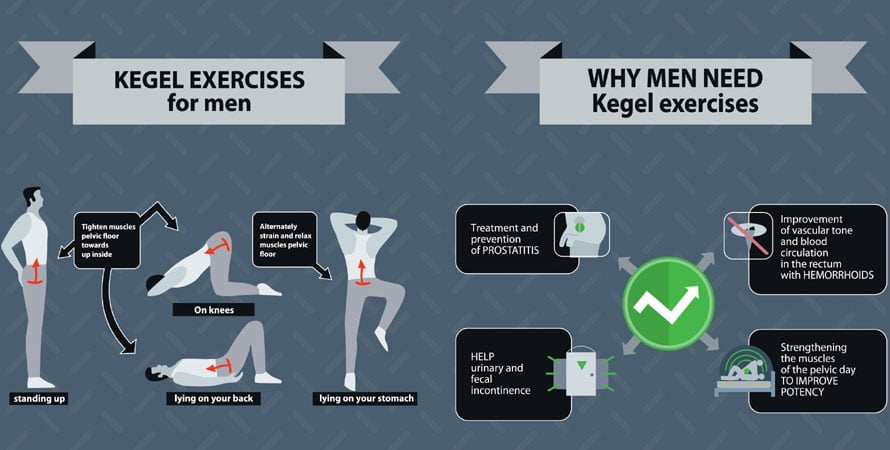
When you are doing your Kegels, try not to engage the muscles of your buttock or abdomen. Focus on your pelvic floor muscles.
Also, note that training these muscles take a long time to make a difference – say a few weeks to a couple of months.
4. Foods
There are a lot of foods, herbs, plant extracts, and natural remedies you can use to cure premature ejaculation. When you treat premature ejaculation with the help of food, it reduces the risk of side effects. Natural home remedies don’t have any risk factors associated with them.
You can also use dietary supplements to fulfill your body’s nutritional needs. For example, zinc is scientifically proven to treat premature ejaculation. You can consume zinc-rich foods, or you can use zinc supplements to delay ejaculation.
Here is a list of the foods that you can use to last longer in bed.
5. OTC Pills
Herbal tablets and supplements that you can purchase without a prescription are also helpful in treating premature ejaculation. Most of these pills are made from plant extracts and natural, ancient herbs that were used in Indian and Chinese traditional medicine systems. Most of these herbs and pills are backed by scientific evidence that they delay ejaculation and help men last longer in bed.
ProSolution Plus, for example, is a leading premature ejaculation solution that is scientifically proven in a double-blind placebo-controlled study that it improves premature ejaculation by 64%.
Check out the best pills for premature ejaculation.
6. Prescription Medicines
There is no FDA approved medication for premature ejaculation. Doctors use selective serotonin reuptake inhibitors which are antidepressants as prescription drugs for premature ejaculation. Antidepressants have a side effect that they delay ejaculation, a reason why you will get an antidepressant to treat premature ejaculation.
Premature Ejaculation FAQs
Here is a list of the premature ejaculation FAQs. The answers will help you understand the early discharge issue better:
1. What Does Premature Ejaculation Feel Like?
The person suffering from premature ejaculation feels like having less or no control over his ejaculation during sexual intercourse or even during foreplay. This leads to a quick release of semen, resulting in embarrassment, anxiety, depression, and low self-esteem.
2. What Triggers Premature Ejaculation?
Premature ejaculation is triggered by several factors including:
1. Abnormal hormonal levels in your body
2. Imbalance in brain chemicals known as neurotransmitters
3. Infection or inflammation of the urinary tract, prostate, or urethra
4. Hereditary traits
5. If you are suffering from erectile dysfunction occasionally or frequently, then the fear of maintaining an erection may subconsciously cause premature ejaculation
6. Psychological factors such as stress play a crucial role in triggering premature ejaculation by reducing your ability to focus during sexual intercourse.
3. What is Considered Premature Ejaculation?
A sexual disorder where a man is not able to control his orgasm during sexual activity is considered premature ejaculation. Instead of time, it is more often linked to releasing orgasm much sooner than your partner would like whether during foreplay or shortly after initial penetration during sexual intercourse.
4. What is the Main Cause of Premature Ejaculation?
The primary cause of premature ejaculation is still unknown. However, imbalance in hormones and brain neurotransmitter chemicals could be contributing factors. Men with low serotonin levels often experience early ejaculation leading to depression, stress, guilt, and sexual insecurity. This develops negative feelings about sex, and eventually, they start avoiding it.
Premature ejaculation may occur at any age. There is no direct relation between age with quick discharge but aging does cause changes in ejaculation time. The older you get the more difficult it is to maintain an erection leading to early ejaculation.
5. Can Pre-Ejaculation Be Cured?
There are three types of premature ejaculation: Primary, secondary, and normal variable. Both secondary and normal variable premature ejaculation are fully curable while primary premature ejaculation is manageable.
The primary premature ejaculation is usually life-long. It occurs from the first sexual encounter and persists life-long. It has no cure but more than 75% of cases can be managed by pharmacological and psychological counseling.
The secondary premature ejaculation occurs due to underlying disease. Treating the underlying disease such as erectile dysfunction may cure the secondary premature ejaculation. Other treatments of premature ejaculation include behavioral techniques, medications, topical anesthetics, and counseling.
The normal variable premature ejaculation occurs randomly. It is curable as it is caused by certain life events such as medications or changes in lifestyle.
6. How Can I Cure Premature Ejaculation?
Premature ejaculation can be cured by several methods and techniques that include:
1. Medications (e.g., premature ejaculation pills, tricyclic antidepressants, phosphodiesterase-5 inhibitors, and selective serotonin reuptake inhibitors, etc.)
2. Behavioral methods include pelvic floor exercises, squeeze-pause techniques, counseling, and more
3. Topical anesthetics such as lidocaine or benzocaine condoms and delay sprays may also help delay ejaculation
4. Lifestyle changes.
7. How Can I Get Rid of Premature Ejaculation Naturally?
The three best ways to get rid of premature ejaculation naturally include:
Pause-squeeze technique: When you feel you are about to ejaculate, ask your partner to squeeze the head of your penis for around half a minute until the desire to expel semen fades away. Repeat the technique to last longer in bed.
Stop-start technique: The stop-start technique is also known as edging may help in controlling your orgasm. You need to completely stop sexual activity the moment you feel the urge to ejaculate. Wait until you feel less aroused. Then restart the sexual activity again and repeat the similar process as much as you need to satisfy yourself and your partner.
Pelvic floor exercises: Also known as Kegel exercise helps strengthen the pubococcygeus muscle that helps you control ejaculation. Find your pelvic floor muscles by stopping urination. You can then do pelvic floor exercise by tightening muscles for 5-10 seconds and then relax your muscles. Do this exercise 3 times (10 reps each set) daily in different positions such as sitting, lying on the bed, etc.
8. What Can I Do to Prevent Early Ejaculation?
If you want to prevent early ejaculation instantly using delay sprays, delay wipes, delay oils, and delay condoms are the best ways. These premature ejaculation products help you prevent early ejaculation immediately.
You can go for a natural method that takes time to prevent early ejaculation. A study found that pelvic floor exercises can help deal with both primary and secondary premature ejaculation by significantly increasing ejaculatory reflex and time to climax.
9. Does Delayed Ejaculation Go Away?
Premature ejaculation usually goes away with the right treatment. If you have secondary premature ejaculation that started recently or isn’t permanent, it will go away easily. Permanent premature ejaculation (known as primary premature ejaculation) is hard to cure as it is by birth and requires special medical attention.
However, most men have normal variable premature ejaculation that goes away automatically without you having to take any medication at all.
10. How Long Should a Man Last Before Ejaculation?
There is no specific time duration for a man to decide a perfect ejaculation time. It is variable and varies from person to person. Time doesn’t really matter as long as you and your sex partner are satisfied with the sexual performance.
According to a study by sexual therapists on how long a man should last by vaginal sexual intercourse, 1-2 minutes was very short, 3-7 minutes was found adequate, and 10-30 minutes was considered too long for sexual intercourse.
11. At What Age Do Guys Start Ejaculating?
The production of spermatozoa or sperm usually begins at the onset of puberty at ages ranging from 10-12. According to a study, the mean age was 13 years old with a range between 12.5 and 15.5 years. However, there is no relation between the age of guys at first ejaculation and their testicular volume, penis length, and presence of pubic hair.
12. What Happens If a Man Releases Sperm Daily?
Semen ejaculation offers numerous health benefits as long as it is not related to the addition of watching porn or masturbation. Releasing sperm daily through sexual activity ensures a reduced risk of cardiovascular disease. Most men think releasing sperm daily is harmful and unhealthy which is just a myth. Science tells us otherwise.
It takes more than 74 days for sperm to mature and you make millions of sperm each day. Men with good sperm count should never worry about regular ejaculation. No scientific studies found that daily ejaculation is unhealthy.
13. Is There a Pill to Help You Last Longer in Bed?
There is a wide range of over-the-counter pills and tablets available for lasting longer in bed. The best ones include:
1. Prosolution Plus: Clinically approved medication, confidence booster, delays orgasm, and enhances libido and desire
2. VigRX Plus: Scientifically engineered formulation, long-lasting erections, intense orgasm, and optimized dosing
3. ProEnhance: Fast arousal, increased libido, mind-blowing harder and bigger erections, orgasms with increased stamina, fast recovery, and increased bioavailability due to enteric coating
4. VigFX: Harder, bigger, and long-lasting erection with enhanced stamina
5. ProSolution Pills: Made with natural ingredients, free of side effects, and long-lasting erections
6. Semenax: Longer orgasms with better control
7. Volume Pills: Increase penis blood circulation with better control on orgasm.
14. What Can You Drink to Last Longer in Bed?
There are several drinks that can help you last longer in bed but nothing beats milk. It is a natural and the most effective drink to help you last longer in bed. It increases libido and boosts stamina to ensure better control over orgasm. Banana shake is a power drink that boosts your sexual energy significantly.
Watermelon strengthens erection as it has amino acids that improve blood circulation in your penis. Aloe vera and pomegranate juice may also be used as they increase testosterone levels, libido, and treat secondary premature ejaculation that’s caused by erectile dysfunction.
15. Does Drinking Water Help Last Longer in Bed?
Yes, drinking water can help as a low intake of water leads to a decline in blood volume and negatively affects your mental state. It has a direct impact on premature ejaculation. A study found that deprivation of water for 18 hours in men leads to decreased penis blood circulation. However, getting them back to drink water after 18 hours increased penis blood circulation.
16. What Herbs Make You Last Longer in Bed?
Various herbs can help men last longer in bed. Some well-known herbs include:
1. Ginseng
2. Epimedium
3. Ginkgo Biloba.
These herbs improve sexual functions by increasing erection time and curing erectile dysfunction. According to a study, herbs and their active molecules have the potential to improve fertility and sexual performance.
17. What Foods Make a Guy Last Longer in Bed?
There are several foods that provide a guy with essential nutrients that help build endurance and increase sexual performance. The key foods to last longer in bed include:
Capsaicin: Foods such as chili pepper, sweet peppers, and ginger root improve climax control.
Potassium: Foods such as banana, spinach, carrot, potato, and broccoli keep cells hydrated and boost sexual performance.
Complex carbohydrates: Oatmeal, brown, and wild rice help lasting longer in bed by boosting stamina.
Proteins–L: Citrulline found in watermelon, onion, garlic, nuts, and legumes boost stamina and strength for maintaining a longer erection.
L-Arginine: L-citrulline gets converted into L-arginine which is an amino acid that helps men in improving penis blood flow. Food such as red meat, fish, soy, poultry, and milk contains a high amount of L-arginine.
18. What Are the Home Remedies for Premature Ejaculation?
One of the best home remedies to prolong sex climax is consuming foods rich in zinc and magnesium. There is strong evidence that both zinc and magnesium can improve sexual performance by increasing stamina and endurance. A study found that males suffering from premature ejaculation had low levels of magnesium in their semen as compared to normal individuals without premature ejaculation.
19. What is the Best Medicine to Last Longer in Bed?
The best medicine to last longer in bed is ProSolution Plus because it is a natural product that treats early discharge exceptionally well. It contains different Chinese herbs that boost libido, sexual desire, increase blood flow in your penis, reduce inflammation, and produce L-Dopa that increases the frequency of erection. ProSolution Plus is recommended by leading healthcare specialists like Dr. Dave.
20. How Can I Stop Premature Ejaculation Immediately?
There is no immediate management of premature ejaculation but some self-help techniques may help you save your relationship by temporarily curing premature ejaculation. This helps you continue sexual relationships while you can work on medical treatment. These temporary but immediate methods include:
1. Use delay sprays or delay wipes to numb your penis and enjoy sex like normal people
2. Using a delay condom containing benzocaine may reduce the sensations during sexual intercourse
3. Try shutting down ejaculatory reflexes during sex
4. Distracting yourself from stimuli by thinking about something else during sexual intercourse
5. Frequent breaks when you feel the urge to ejaculate.
21. Does Viagra Stop You from Coming Early?
Yes, it does.
According to the Boston University School of Medicine, Viagra is prescribed mainly for erectile dysfunction but it can also be prescribed for premature ejaculation because it helps in maintaining the erection for a while after ejaculation and reduces the time before you get a second erection. This ensures satisfaction for your partner.
22. What Should I Eat to Last Longer in Bed?
The best way to last longer in bed is by taking a healthy diet. A diet that contains oysters, meat, salmon, nuts and seeds, beets, milk, and apples is considered the best diet for boosting male sexual performance and reducing the complaint of premature ejaculation.
Conclusion
Premature ejaculation may be resolved with medical treatment, medicines, delay sprays, wipes, behavioral therapy, sex therapy, couple therapy, or exercise.
It is possible to have sexual satisfaction with your female partner even without vaginal penetration. Oral sex can do the trick while you seek medical treatment.
The most important thing to note is that premature ejaculation can be cured. It is nothing other than a small part of your physical relationship. Supporting and understanding your partner’s needs is key to resolving it.
Updated: September 04, 2023

